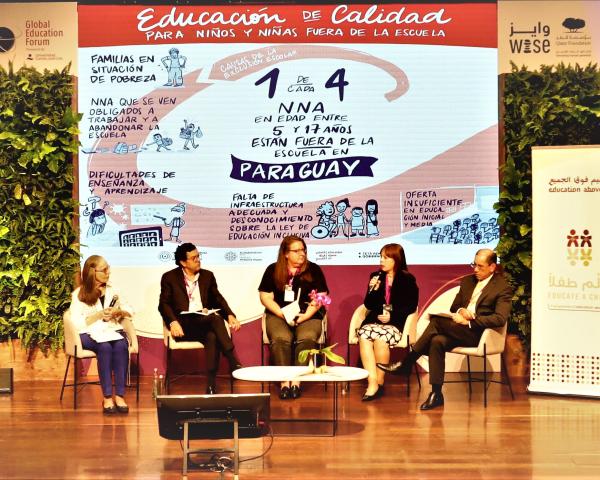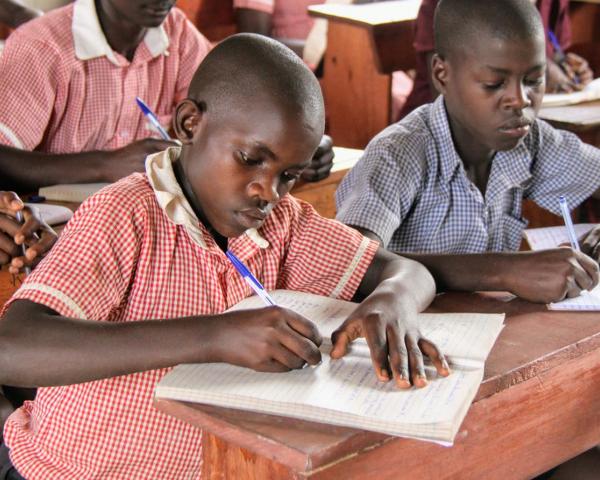Education Above All Unveils Innovative Classroom Solutions for Out of School Children
At the culmination of the World Innovation Summit on Education (WISE), Her Highness Sheikha Moza bint Nasser, founder and chairperson of the Education Above All Foundation (EAA), highlighted a number of education innovations and new efforts at the convening, including unveiling the first classroom prototype, based on one of the late Dame Zaha Hadid’s final projects.
The classroom was developed in partnership between EAA and Zaha Hadid Architects (ZHA) and due to be produced by the Supreme Committee for Delivery & Legacy (Supreme Committee) – the organisation tasked with delivering the infrastructure and operations required for the FIFA World Cup Qatar 2022™. The Supreme Committee has committed to fund up to 100 structures. The classroom features a number of innovative design solutions that will allow it to function as both a learning space and community hub for those living through the realities of current day migration and displacement. After WISE 2019, the classroom project will be further developed in the field in Mali, where it will be used to support the educational needs of two local communities.
The classroom project was borne out of a fusion of perspectives on regional and global education priorities between Her Highness and world-renowned architect Hadid. With more than 59 million children out of school across the globe, the need for pioneering solutions has never been greater. The two powerful visionaries joined forces in 2015 to take on one of the most persistently underserved issues in the world: quality education for out of school children (OOSC). The aim of the project was to transform how traditional classroom spaces are fabricated and constructed for OOSC to learn and thrive. “We had a mandate to carry Her Highness’ vision for this project forward, both as a way to honor the legacy of Dame Hadid, but also in the service of out of school children around the world,” said Fahad Al Sulaiti, CEO, EAA.
Because of a scarcity of resources, many classrooms intended for OOSC are structures that were originally designed for other purposes including prefabricated office units and storage tents—often providing functional but less than desirable learning spaces. To address this issue, the designers at ZHA, along with EAA, took on the challenge to change this reality. The result is a prototype that can function as a classroom, but in the form of a beautiful, airy structure for students to gather, learn and explore. During non-school hours, the structures may also become a focal point and central hub for communities living through the realities of current day displacement and migration experiences.
“Our approach was based on the objective of creating spaces that offer customized and transformative solutions focused on education and the support of students’ and communities’ social and emotional well-being,” said Charles Walker, Director, Zaha Hadid Architects. The classrooms represent the evolution in Hadid’s work with tented structures which began with her projects for the Serpentine Gallery. They are constructed around the following criteria: feasibility, constructability, modularity, flexibility and thermal condition. The design and construction are economically viable, meeting the restraints of their surroundings including available resources, material and labour. Each 12 metres by 8 metres module will serve as a classroom for 45 students. The modular system allows for flexibility in the assembling and dismantling processes and is optimized for flat-pack logistic demands. Additionally, the classroom prototype will enhance the thermal performance of the currently available classrooms by addressing fabric quality, ventilation possibilities and lighting conditions.
To propel this project forward, EAA formed a partnership with the Supreme Committee. “We have always said that our vision for the FIFA World Cup in Qatar would be to ensure a legacy was left long after the last ball has been kicked in 2022,” said H.E. Hassan Al Thawadi, Secretary General of the Supreme Committee. “This project with EAA and Zaha Hadid Architects perfectly captures that vision. Much like Qatar’s modular stadiums, these innovative structures have been designed with a legacy usage in mind and will be used during the tournament for a variety of purposes before being dismantled, repurposed and reconstructed into classrooms that will be donated to countries around the world and help thousands of out of school children,” he continued.
The Supreme Committee, in partnership with EAA has chosen the project as a key feature of its post-2022 sustainability legacy to further the achievement of the UN’s Sustainable Development Goals (SDG), particularly important as Her Highness is a UN SDG Advocate for Quality Education (SDG4). Qatar made history by winning the right to host the FIFA World Cup Qatar 2022™ and becoming the first Middle Eastern country to ever do so. In the years since, the country has used this opportunity to not only work on developing an exceptional experience for sports fans, but also to create a lasting legacy. The converted classroom structures are planned to be deployed post-2022 in Cambodia, Cameroon, Colombia, Jordan, Lebanon, Mali, Myanmar, Palestine, South Sudan, Sri Lanka, Turkey and Uganda.























